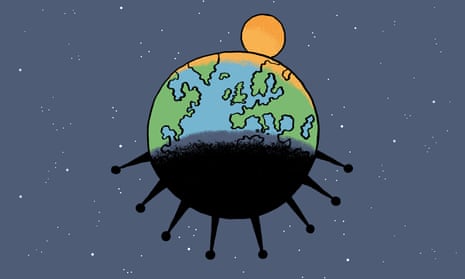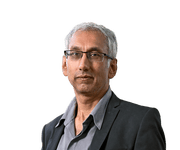Rich countries have administered more doses of Covid vaccine than the size of their populations – an average of 105 doses per 100 people. In low-income countries, that figure is just two per 100 people. It is a disparity that is likely to define the post-pandemic world.
There has been much discussion about the inequalities that Covid has exposed both within nations and between them. Paradoxically, though, it is now that we are beginning to get the virus under control that inequalities may become most exposed.
There is little possibility that the virus will be eradicated. Rather, it is likely to become endemic but contained in most western nations. The efficacy of vaccines will enable people in richer countries to “live with the virus”. Not so in poorer nations. The 30 poorest countries in the world, with a combined population of almost a billion, have vaccinated on average barely 2% of their population. In the Democratic Republic of the Congo the figure is 0.1%, in Haiti 0.24%, in Chad 0.27%, in Tanzania 0.36%. “Living with the virus” will mean something very different in such countries than it will in the west.
Policies pursued by rich countries will make it even more difficult for poorer nations to live with the virus. By the end of this year, the G7 club of the world’s biggest economies will have stockpiled almost 1bn spare doses of Covid vaccines; Britain alone has more than 200m. That G7 stockpile would be more than sufficient to vaccinate the entire adult population of sub-Saharan Africa.
The irony is that many poor countries show low levels of vaccine hesitancy, but have no supplies for communities eager for inoculation, whereas in many of the countries hoarding the stuff, more people are sceptical about the vaccine. The evidence, one of the authors of a study on global vaccine hesitancy observes, is that “prioritising vaccine distribution to the Global South should yield high returns in advancing global immunisation coverage”. Yet, in a system in which vaccines are distributed according to how deep your pockets are, logic and need have little sway.
The story of Covax lays bare the problem of global inequity. Organised jointly by the World Health Organization, GAVI, a campaign to increase access to immunisation in poor countries, and the Coalition for Epidemic Preparedness Innovations (CEPI), Covax aims for a fairer global distribution by allocating vaccines to 92 low- and middle-income countries. It has so far delivered less than 10% of the 2bn doses promised.
One reason for the shortfall is that richer countries have been able to elbow Covax out of the vaccine marketplace, making it difficult to obtain sufficient doses. Absurdly, having pushed Covax aside to get to the front of the vaccine queue, many rich countries have subsequently bought vaccines for themselves through the scheme, despite its diminished stock. Britain, Canada, Australia, New Zealand, South Korea, Saudi Arabia and Qatar have all acquired hundreds of thousands of doses of Covax vaccines. It’s scandalously selfish, but barely acknowledged.
Until recently, except for one or two hotspots, African nations have had relatively low numbers of infections and deaths, though that may reflect poor data collection rather than the reality of Covid on the continent. Now, though, things are changing rapidly. Even as the Delta variant has been largely brought under control in Europe, vaccination weakening the link between infections, illness and hospitalisation, it is ripping through much of sub-Saharan Africa.
The majority of the British population are double-jabbed. Nevertheless, some hospitals are facing considerable pressure. So imagine what it must be like in a country such as the Democratic Republic of the Congo or Tanzania, in which fewer than half of 1% of the population are vaccinated, and in which the health infrastructure was barely functioning even before the pandemic. To add to the pressure, Covid has reduced the capacity of such countries to deal with other endemic diseases. One study suggested that deaths due to HIV, tuberculosis and malaria could, over the next five years, increase by 10%, 20% and 36% respectively, compared with what might have been the case without the Covid crisis.

Beyond the immediate impact on health services lies the longer-term impact on post-pandemic economic recovery. The IMF has warned of “a worsening two-track recovery, driven by dramatic differences in vaccine availability”. Not only will the poor suffer from Covid, they will suffer even more from slowness of recovery from Covid.
Perhaps most insidiously, Covid policies are likely to reinforce the physical segregation of the world. Already, rich nations live as if in gated communities, within Fortress Europe, Fortress Britain, Fortress Australia, all designed to keep out those from poorer nations, whether migrants or refugees. “Offshoring” – the insistence that irregular migrants and asylum seekers should be processed not in the place of arrival but in a third country – is now common practice in the west. The US is treating even Afghan refugees in this fashion.
In the post-pandemic world, defined by vaccine passports and quarantines, such policies will become more entrenched still. Last week, Greek police fined irregular migrants €5,000 the moment they stepped off their boats for failing to have taken a Covid test before arrival. It was an absurd move, designed more to frighten and humiliate than to enforce Covid policy. After an outcry, the police backtracked. Nevertheless, it provided a glimpse of the coming world, in which fears of Covid may become a further excuse to enforce harsh, discriminatory immigration policies.
From TB to Aids, there is a long history of the authorities using anxieties about disease as a form of immigration control to keep out the unwelcome. In a world segregated between the vaccinated rich and the unvaccinated poor, many non-western countries may find themselves on a “red list” in more ways than one.
There are reasons of self-interest, too, for trying to ensure global vaccination. Large unvaccinated populations create greater scope for new variants to emerge, variants that might render existing vaccines less effective, and so leave even inoculated populations more vulnerable. Selfishness is not just harmful to other people, it may not even be in one’s own self-interest.
Inequality helped define the pandemic. It is likely to define even more the post-pandemic world. And it will do so because of deliberate “I’m all right, Jack” decisions taken by politicians in the rich world.

